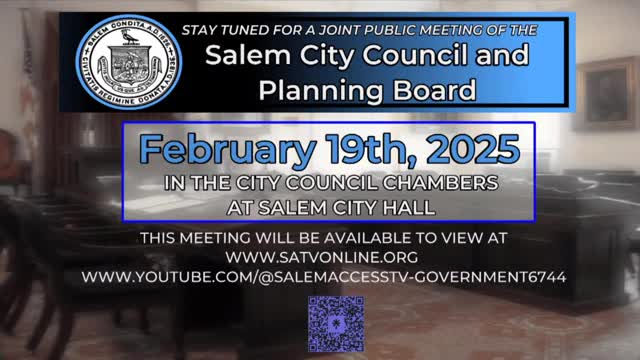Salem council holds hearing on B‑1 zoning change for neighborhood businesses; refers matter to planning board
Get AI-powered insights, summaries, and transcripts
Subscribe
Summary
The Salem City Council held a joint public hearing Feb. 19 on a proposed amendment to the B‑1 business-neighborhood zoning table to allow certain commercial recreation uses and restaurants serving alcohol by special permit. After public comment, the council voted to refer the proposal to the Planning Board for a recommendation.
A public hearing before the Salem City Council and the Planning Board on Feb. 19 considered a proposed amendment to the city's business-neighborhood (B‑1) zoning table to allow commercial recreation and restaurants serving alcohol in additional B‑1 parcels.
The amendment, introduced at the request of the mayor and discussed at the City Hall Council Chambers, would change some B‑1 entries in Section 3.1 of the zoning ordinance from "N" (not allowed) to "BA" (Board of Appeals review, i.e., allowed by special permit after appeal/board review). Councilor Cohen, who put the order back on the council calendar after the prior cycle expired, said the change is intended to support more walkable neighborhood amenities. "You can't create a neighborhood with a building or five buildings," Councilor Cohen said, arguing that adding neighborhood services can reduce driving and traffic.
The hearing drew speakers on both sides. Supporters said the change would expand neighborhood options and accessibility. Erin Britt, a South Salem resident, told the council the B‑1 change would help small businesses and create more walkable options in neighborhoods. "I want to have a walkable community," Britt said. Residents who favored the amendment pointed to long walks to existing restaurants and the limited local grocery options.
Opponents, many from the Derby Street area, raised concerns about parking, noise, deliveries and public-safety impacts in dense residential blocks. Councilor Jerzall (Ward 1) said residents had voiced "strong opposition" on grounds including parking difficulties and noise; a public speaker, Phil Laffey, asked, "Do we need more? I'm not sure," noting the council had heard counts of more than 80 liquor-serving establishments in Salem.
Several councilors emphasized the legal and procedural safeguards. Councilor Watson Felt and others noted that the proposed change would not create an automatic by-right entitlement and that affected uses would still require separate permitting and board review. "It is still a special permit," a member of the public and multiple councilors reiterated; councilors also stressed that zoning changes are subject to the Planning Board's recommendation, the Zoning Board of Appeals and licensing processes that provide additional public input.
After public testimony, Councilor Cohen moved to close the public hearing; the motion was seconded by Councilor Watson Felt and the public hearing was closed. The City Council then voted to refer the matter to the Planning Board for its recommendation, a step council members said would occur under the usual 21-day period for board review. The Planning Board likewise closed its portion of the public hearing by roll call and will take up the referral.
The council and multiple public speakers highlighted that only a small share of the city's commercial parcels would be affected if the change is adopted. Councilor Watson Felt and others described the B‑1 zone boundaries as "invisible lines" that can produce different rules for immediately adjacent properties; proponents argued this undercut equity and the open market for neighborhood businesses, while opponents asked the council to preserve residential character in historic sections like Derby Street.
The matter will return to the council after the Planning Board issues its recommendation; no zoning amendment was adopted at the Feb. 19 meeting.
For reference, the hearing notice was posted on Feb. 12, 2025, and advertised in the Salem News on Feb. 5 and Feb. 12, 2025.
